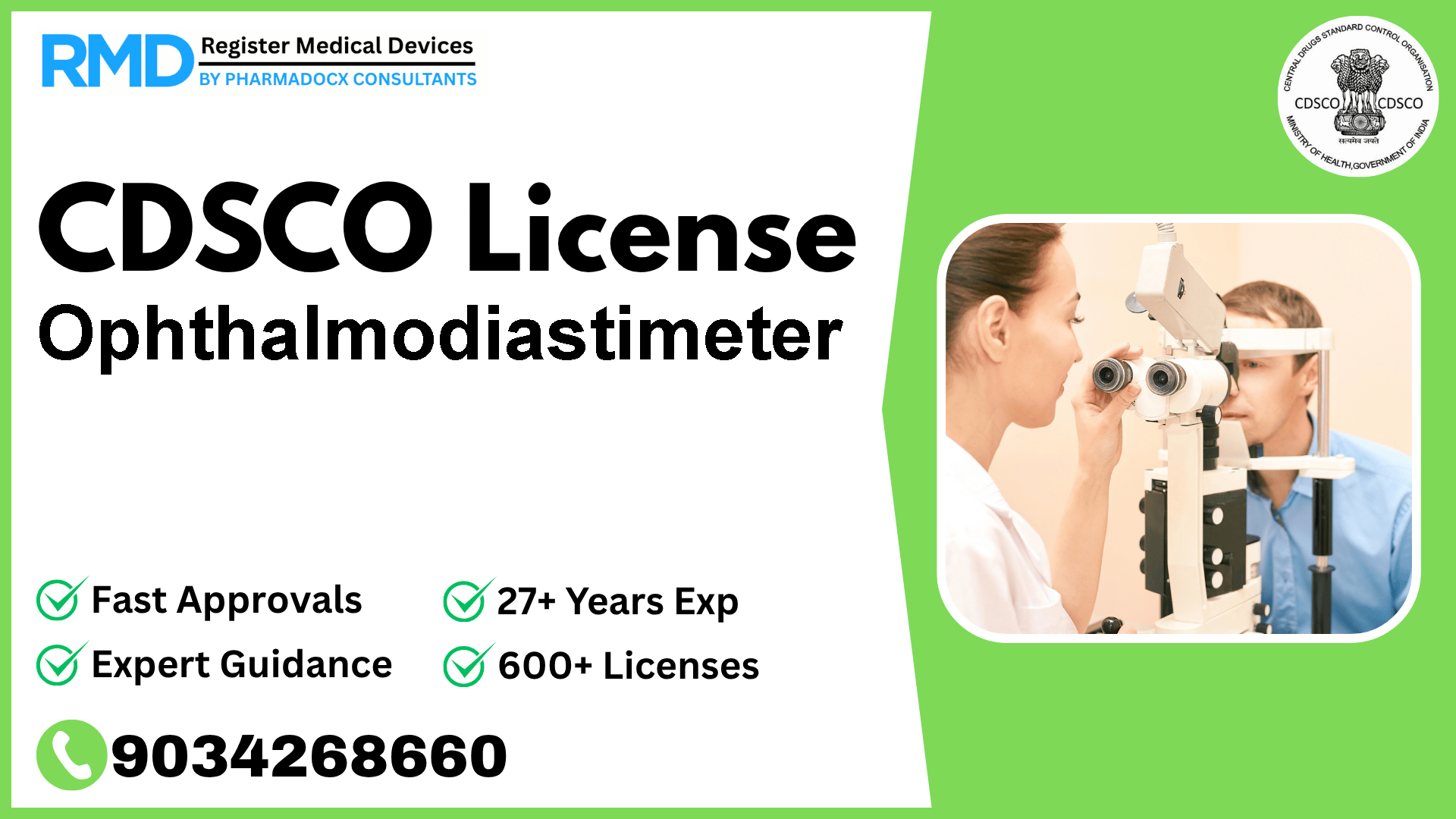CDSCO License for Ophthalmodiastimeter
Medical Device Information
Important Notice for Class A Devices
Class A Non-sterile Non Measuring devices are exempt from MD5 and MD15 licenses. Only CDSCO registration is required as per GSR 777(E).
Intended Use
An ophthalmic instrument for determining the proper distance at which to place prescription lenses for the two eyes.

Comprehensive Guide to CDSCO Licensing for Ophthalmodiastimeter (Class A Medical Device)
Manufacturers and importers looking to enter the Indian market with the Ophthalmodiastimeter—a specialized ophthalmic instrument used to determine the optimal lens placement distance for both eyes—must navigate the CDSCO regulatory landscape carefully. Classified as a Class A device under the CDSCO risk classification framework, this medical device requires an MD5 manufacturing license, governed by State Licensing Authorities. With over 25 years of expertise and having assisted 500+ companies with successful CDSCO registrations, we provide you with a detailed, practical roadmap to secure your license for this device.
CDSCO Regulatory Framework for Ophthalmodiastimeter
The Ophthalmodiastimeter falls under the ophthalmology category and is notified under Fts No. 29/MiscJO3/2020-DC (187) dated 9.8.2021. As a Class A device, it is considered low risk, but compliance with regulatory requirements remains mandatory to ensure patient safety and market legitimacy. The regulatory oversight involves multiple stages: initial test license, product testing, documentation, audit by notified bodies, and final license grant.
Risk Classification and License Requirements
- Risk Class: A (Low Risk)
- License Type: MD5 License (Manufacturing)
- Authority: State Licensing Authority
- Application Form: MD3
Manufacturers must first procure a test license (Form MD13) before applying for the MD5 license. This step helps validate the device’s safety and performance through government-approved testing.
Manufacturing License Process (MD5) for Ophthalmodiastimeter
- Apply for Test License (Form MD13): Initiate application via the CDSCO MD Online Portal to obtain a test license, allowing for product sample testing.
- Product Testing: Send the Ophthalmodiastimeter samples to CDSCO-approved testing laboratories listed on the Testing Laboratories page for performance validation.
- Document Preparation: Compile comprehensive documents, including Device Master File, Plant Master File, Risk Management File, and Essential Principles Checklist.
- Application Submission (Form MD3): Submit the manufacturing license application for MD5 on the CDSCO portal.
- Audit by Notified Body: A notified body, selected from the list of notified bodies, conducts facility and quality system audits.
- Query Resolution: Address any queries raised by CDSCO or notified bodies promptly.
- License Grant: Upon successful audit and query resolution, the State Licensing Authority issues the MD5 license.
Manufacturing License Documents Required
- Company Constitution (e.g., MOA, AOA)
- Proof of Ownership or Lease Agreement of Manufacturing Premises
- Details and Qualification Certificates of Technical Staff
- Fire NOC & Pollution Control NOC
- Device Master File (DMF) – Refer to our detailed Device Master File guide
- Plant Master File (PMF) – See our Plant Master File guide
- Essential Principles Checklist
- Risk Management File – Best practices explained in Risk Management guide
- Test Reports from Government-Approved Labs
- Labels and Instructions for Use (IFU)
- Quality Management System (QMS) Documents, typically ISO 13485:2016 compliant
Import License Process (MD15) for Ophthalmodiastimeter
For importers, the MD15 license is mandatory, granted by the Central Licensing Authority. This process takes approximately 5-6 months and involves:
- Document preparation, including the manufacturing license of the overseas manufacturer, Free Sale Certificate, ISO 13485 certification, CE Certificate (if applicable), DMF, PMF, and Wholesale License.
- Application submission on the CDSCO MD Online Portal using Form MD14.
- Review and query resolution followed by issuance of MD15 license.
Refer to our Import License guide for detailed insights.
Timeline and Processing Duration
| Step | Duration |
|---|---|
| Test License (MD13) | 1.5 to 2 months |
| Product Testing | 1 to 1.5 months |
| Document Preparation | 2 to 3 weeks |
| Audit by Notified Body | 2 to 3 weeks |
| Query Resolution & License Grant | 2 to 4 weeks |
Total duration: Approximately 3 to 4 months from test license application to MD5 license grant.
Government Fees and Costs
- Test License (MD13): Included in the process
- MD5 License Application Fee: Rs 5,000 per application
- Per Product Fee: Rs 500 per product
Note: Additional costs include testing laboratory fees and notified body audit charges, which vary depending on the scope and location.
Common Challenges and Solutions
- Delayed Testing Reports: Plan sample submissions early to avoid bottlenecks; use CDSCO approved labs listed here.
- Incomplete Documentation: Use comprehensive checklists and templates for DMF and PMF to ensure all aspects are covered.
- Audit Non-Compliance: Prepare for audits by conducting internal mock audits and training staff thoroughly.
- Query Management: Assign experienced regulatory personnel or consultants to respond to CDSCO queries promptly and accurately.
Expert Consultation and Support
Navigating the CDSCO licensing process can be intricate, especially for first-time applicants. We leverage two and a half decades of experience and deep regulatory knowledge to streamline your application journey. Our hands-on support includes document drafting, audit readiness, and liaison with regulatory authorities to expedite approvals.
Getting Started with Your CDSCO License Application for Ophthalmodiastimeter
- Assess your Device Classification: Confirm the Ophthalmodiastimeter’s Class A status via the Medical Device Classification tool.
- Prepare Initial Documents: Begin compiling your Device Master File and Plant Master File.
- Register on CDSCO MD Online Portal: Submit your test license application (Form MD13) early to kickstart the process.
- Engage a Notified Body: Identify and contact a notified body from the official list for audit scheduling.
- Plan for Testing: Coordinate with government-approved labs for timely product testing.
- Consult Professionals: Leverage expert consultancy to avoid pitfalls and accelerate your license grant.
By following these actionable steps and leveraging our proven track record, you can confidently place your Ophthalmodiastimeter into the Indian medical device market with full regulatory compliance and peace of mind.